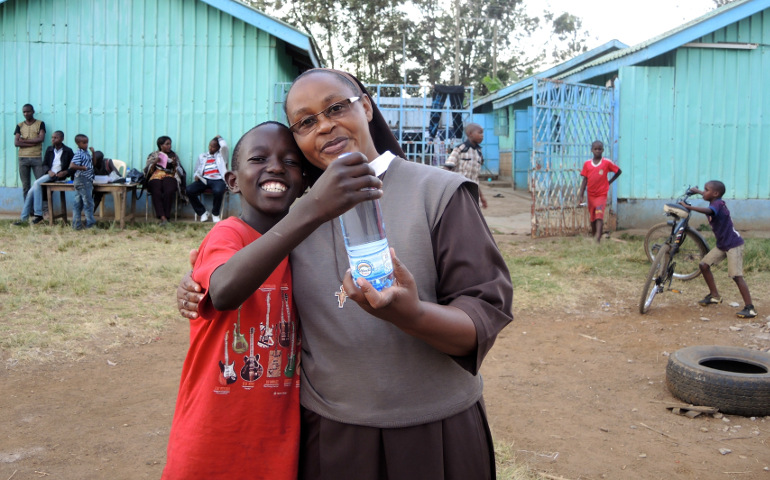

RELIGIOUS LIFE IN THE 21ST CENTURY: THE PROSPECT OF REFOUNDING
By Diarmuid O'Murchu
Published by Orbis Books, 272 pages, $26
For decades, debate has raged about what the future of religious life will look like. The answer, it seems, is that the future is unknown.
What is clear is that the reality of religious life has and will continue to change. Dramatic declines in membership, changing cultural norms and shifting social realities ensure that religious life in the 21st century must evolve to survive. This evolution requires that religious work to be ready for refounding when the time comes.
With this sense of an unknown, not necessarily unclear, future, Diarmuid O'Murchu, social psychologist and Missionary of the Sacred Heart, undertakes his landmark 25th book, Religious Life in the 21st Century: The Prospect of Refounding.
Drawing on threads from his first book, The Seed Must Die: Religious Life, Survival or Extinction, O'Murchu faces the complex current reality of religious life. Synthesizing the past, present and future, he provides insight and a challenge to all readers, vowed religious or not, as he considers the necessity of a paradigm shift within religious life and the church and proposes a re-visioning of radical engagement, authenticity and accountability for religious and the world in the 21st century.
The roots of a new understanding of religious life lie in an understanding of the paradigm religious have historically followed and the often misunderstood and misrepresented history of religious life. So O'Murchu spends the first half of the book tracing the roots of religious life and its inherently prophetic nature. Religious life has evolved over the past two millennia, with a constant reliance on community and discernment. In that time, the image of the religious as one who flees the world for individual holiness has developed under the auspices of the archetypal hero.
This paradigm, O'Murchu argues, needs to shift. No hero will rescue religious life. The future lies in communities of courage and collaboration. For inspiration, O'Murchu turns to those he calls "the great foundresses," exploring their stories and reclaiming a largely subverted history of religious life. By distilling their core motivations and character strengths, religious today can discover a path to the future.
This path first requires recognition that today's religious life is dying. O'Murchu points to the cyclical nature of religious life, a historic pattern of birth-death-rebirth on a 300-year cycle. By the mid-21st century, religious life globally will be in crisis, including those groups that seem to be flourishing in the global south today.
Second, the paradigm of religious life as a fleeing from the world — which began to change at Vatican II — needs to completely shift to a communal recognition of, and commitment to, seeking the reign of God. O'Murchu renames this concept the "Companionship of Empowerment." Religious life in the 21st century will be dependent on this shift, as religious embrace the liminal nature of their vocations and recognize their societal role to embody the core values of Christian belief and to radiate those values in the world.
This value radiation will take religious life far and wide. In most cases, O'Murchu argues, this will mean a shift away from functional and practical ministry within the institutional church to a wider recognition of the need to serve the prophetic call of religious life in the world by reading and responding to the signs of the times as cultural catalysts.
This shift also requires honest, adult conversation within religious orders and congregations, delving more deeply into the radical call of the Gospel and how that call will reform the current understanding of constitutive elements of religious life, such as the vows, community and discernment. The prospect of refounding and, indeed, the future of religious life depend on such communal soul-searching.
O'Murchu's view of religious as androgynes and his allusion to reform in celibate sexual intimacy, in this reviewer's opinion, take away from the larger discussion of sexuality within religious life, the harnessing of divine eroticism, and the consideration of sexuality beyond procreation. Much more poignant and challenging is his criticism of the hypocrisy of congregations that claim a commitment to a preferential option for the poor but also lead upper-middle-class lifestyles that do not meet the ideals of ecologic and economic sustainability.
Religious Life in the 21st Century deals with tough topics in a candid and evenhanded manner. Looking at the core doubts that break down and eliminate critical conversations within congregations, O'Murchu calls religious to something more. Citing the stark decline in religious life, he addresses the paschal dimension of refounding religious life where dying will be required.
To prepare for that death (and hopeful rising), religious need to respond to the signs of the times with courage, risk and prophetic imagination, renewing their Christ-centeredness and re-appropriating their founding charisms.
"Refounding is not easy: it was never meant to be," O'Murchu writes in the penultimate chapter of Religious Life in the 21st Century, "and yet it is a possibility for all of us, no matter how stuck we may feel." The future of religious life is a holy mystery waiting to be discovered. Faith in the future is where hope for life — even beyond death — lies. Putting that faith into action and modeling such radical faithfulness will be the work and call of religious life in the 21st century.
[St. Joseph Sr. Colleen Gibson is the assistant director of campus ministry at Chestnut Hill College in Philadelphia.]




